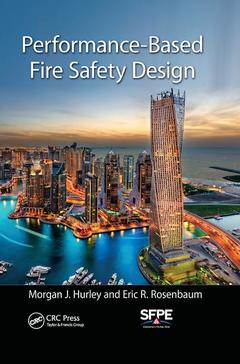Description
Performance-Based Fire Safety Design
Authors: Hurley Morgan J., Rosenbaum Eric R.
Language: English
Subjects for Performance-Based Fire Safety Design:
Keywords
Heat Release Rates; Performance Based Fire Safety Design; NFPA; Performancebased Design; SFPE Handbook; Smoke Productions Rates; Life Safety Code; Fire Protection Engineers; Occupant Characteristics; Fire Dynamics Simulator; Cone Calorimeter; Smoke Layer; Smoke Control System; Heat Release Rate Data; Feed; Lethal Concentration; Peak Heat Release Rate; Prescriptive Codes; Oxygen Consumption Calorimetry; Ceiling Jet; Fire Testing; Fire Risk Assessment; Smoke Concentration; Safety Factors; Species Production Rate
55.07 €
In Print (Delivery period: 14 days).
Add to cartPublication date: 12-2019
· 15.6x23.4 cm · Paperback
89.57 €
In Print (Delivery period: 15 days).
Add to cartPublication date: 04-2015
· 15.6x23.4 cm · Hardback
Description
/li>Contents
/li>Readership
/li>Biography
/li>
Master an Approach Based on Fire Safety Goals, Fire Scenarios, and the Assessment of Design Alternatives
Performance-Based Fire Safety Design demonstrates how fire science can be used to solve fire protection problems in the built environment. It also provides an understanding of the performance-based design process, deterministic and risk-based analysis techniques, development of design fire scenarios, trial design development and analysis, and building lifecycle management.
Develop a Strategy That Meets the Fire Safety Goals for a Building
Topics addressed include designing to protect people from fire, design of detection systems, smoke control systems and structural fire resistance, addressing computational and design uncertainty, and fire testing to support design development or evaluation.
- Identifies key attributes of performance-based design
- Reviews the advantages and disadvantages of performance-based design over specification-based prescriptive design
- Provides a series of steps offering a framework/process for performance-based design
Performance-Based Fire Safety Design focuses on the development and application of performance-based fire safety design approaches. Written by leading experts in the field, this text addresses the unique features and uses of a building and helps you gain a better understanding of how a building will perform in the event of a fire.
Introduction. Hazard and Risk. Design Fire Scenarios. Design Fires. Fire Dynamics and Hazard Calculations. Human Behavior. Detection and Suppression System Design. Smoke Control Design. Structural Fire Resistance. Fire Testing. Performance-Based Design Documentation and Management. Uncertainty.
Morgan Hurley is project director at Aon Fire Protection Engineering in Maryland and former technical director of SFPE. He serves as adjunct faculty at the University of Maryland and California Polytechnic State University. Morgan chaired the NFPA Life Safety Code Technical Committee on Fundamentals, which developed the performance-based design option in NFPA 101 and NFPA 5000. Morgan is a recipient of the Committee Service Award for distinguished service in the development of NFPA codes and standards from NFPA. He is also a licensed professional engineer.
Eric Rosenbaum




